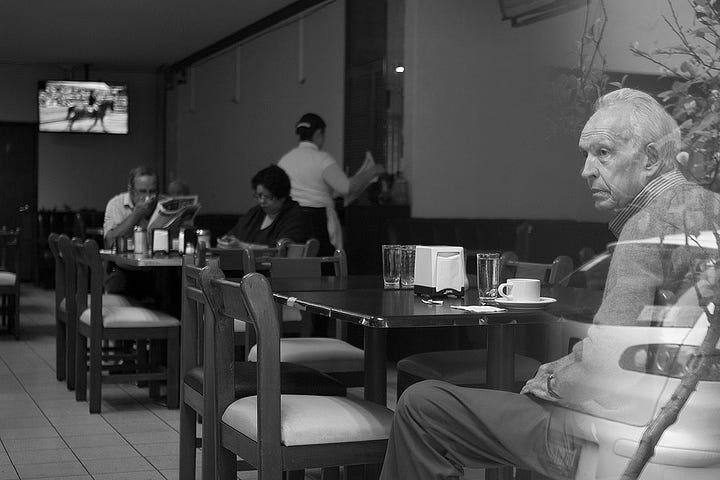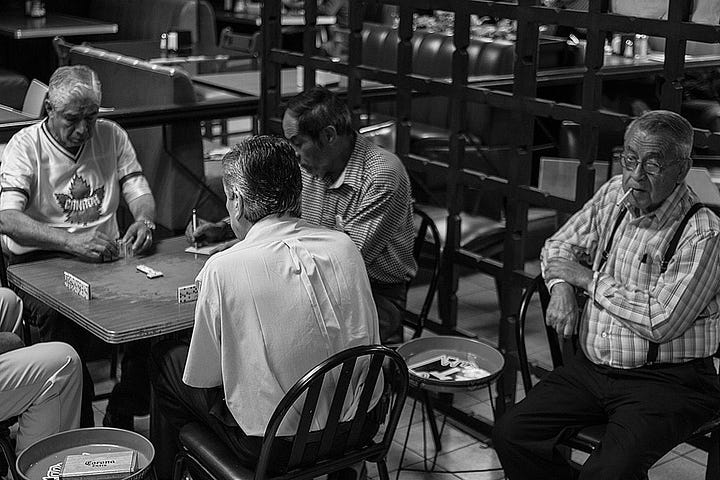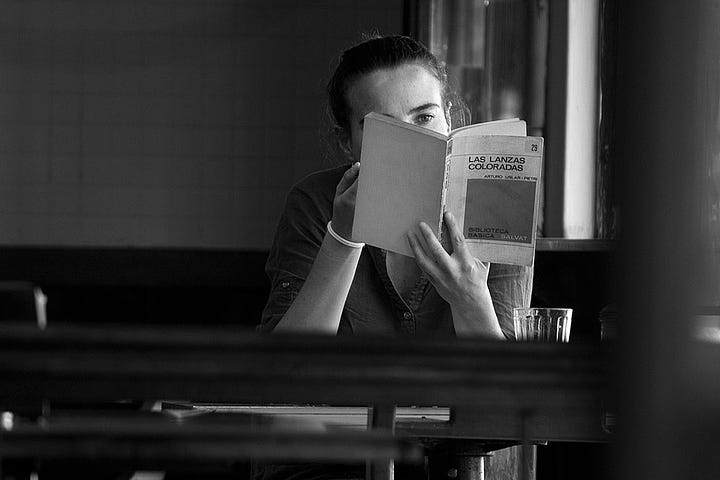Dear Friends,
Apologies for the truly terrible audio quality of the voiceover. In this week’s newsletter:
The importance of the coffeehouse as a second home (for some)
Should Guadalajara, Mexico change its name?
A playlist of anthemic, transcendental rock ballads
☕️ The coffeehouse as a second home
Greetings from Cafe Madoka in Guadalajara. This cafe has been here for more than 60 years and its espresso machine looks even older. As a teenager, my wife would drop off her grandfather most mornings for coffee, dominoes, and socializing. He passed away just a couple of years after we started dating, so I didn’t have the chance to get to know him as much as I would have liked. Well into his 80s, he still dressed like a Beatnik from the 1950s. He wasn’t one to speak much — at least not to an American dating his granddaughter — but I could always get him to talk about Carl Sagan.
Today, there are as many women in Cafe Madoka as men. When I ask my waitress about the gender parity, she tells me that just a decade ago 95% of the customers were men. Here is what one of the longtime patrons told a reporter back in 2014:
A coffeehouse, like a cantina, wouldn’t explicitly discriminate against women, but they were basically places for men. It was a meeting place, where you could play dominoes and chess. But fundamentally it was a place to have coffee, smoke a cigarette, and talk to friends. One could spend hours consuming just one or two coffees. They didn't pressure you. These were very cozy places. Coffee was something extremely important in the lives of these men.
Cafe Madoka opened in 1959. The next year, the owner offered a job to a 17-year-old named Bertha Eduviges Solís, who everyone called “Bibi.” She continued to work here for the next 60 years. From the same 2014 article:
Bibi arrives to Madoka at 6:10 in the morning and leaves at four in the afternoon. When she walks to her house in Colonia Analco, some loyal customers shout to her "goodbye, Bibi!" and she feels good.
When Bibi was a waitress she served the novelist Juan Rulfo. She says that he was a very serious man who arrived around eight at night and left at 10. She says that the author of "El Llano en Llamas" and "Pedro Páramo" would order an espresso and a coke.
A few years ago, Lado B published a photoessay by Alejandra Levya with some lovely black and white photographs that I’ve included below. A customer tells her:
“If you come to Madoka, it's not so much for the food; it's for the waitresses and how they treat you. They make you feel important," says Don Gabriel, a customer who went bankrupt a few years ago but didn't stop going to Madoka every day, "because it’s part of me," he says.
Should we feel happy or sad for Bibi? From 17 to 77 years old, she spent her entire life working in this cafe. Did she every travel abroad? Did she ever leave Guadalajara? Did she spend her entire life serving helpless men? Bibi told reporters that she never considered retiring; working at Madoka is what gave her life meaning. Everyone knew and adored Bibi. A famous singer, Rafael Garcia, would sing Las Mañanitas on her birthday.
The manager of Madoka today, a young woman in her 30s, tells me that Bibi retired in 2019, but she would still come in most mornings for coffee and breakfast. The manager points to a nearby table and says that last year Bibi was seated at her usual table when she suffered an apendicitis and passed away a few days later. She was 79 years old. In her last interview from 2018, she told the reporter:
Most of my viejitos have passed away. There are almost no more of the old customers, very few. Now its their children who come in to remember, or their the wives, because this was home to many old men.




☪️ Does Guadalajara need a new name?
I am writing to you from the Valley of Stones, or as it is written in Arabic وادي الحجارة. Less than a century after the death of the Prophet Muhammad, an army of Arabs and Berbers conquered the Iberian Peninsula and established a village 40 miles to the northeast of modern-day Madrid that they named Wādī l-Ḥiŷāra, or “Valley of Stones.” It remained under Islamic Berber rule until the Christian conquest of Toledo in 1085 when the name of the village was romanized to “Guadalajara.”
Some 400 years later, Nuño Beltrán de Guzmán was born in the village and grew up to become the bodyguard of the Holy Roman Emperor. Charles V worried that Hernan Cortes was becoming too powerful after his successful conquest of Mexico City and so he sent his bodyguard to Nueva España to stir some shit up.
Nuño was, to borrow from Donald Trump, a “bad hombre.” Arriving to Mexico in 1527, he took away titles of nobility and property from supporters of Cortes while handing out “slaving permissions” to his supporters to enslave indigenous Mexicans. After implementing a slave trade that sent indigenous Mexican slaves to work in the Caribbean islands, he organized a brutally violent conquest of Western Mexico.
One of Guzman’s captains, in an act of incredible brown-nosing, named the city of Guadalajara after the birthplace of his notoriously violent boss.
Guzman’s biographer describes his character as “cruelty of the highest order, ambition without limit, a refined hypocrisy, great immorality, ingratitude without equal, and a fierce hatred for Cortés.”
Today, Guadalajara, Spain is a forgotten village of fewer than 100,000 people. The greater metropolitan area of Guadalajara, Mexico meanwhile has more than 5 million people, is a center of technological innovation, and hosts (this very week!) the largest international book fair after Frankfurt’s.
Maybe it’s time for the residents of Guadalajara to consider a new brand?
🎵 Music to sing along to on your bicycle
Friends, I leave you with a playlist of anthemic, transcendental ballads.
Next week, maybe:
How text is like horses
Leadership advice from the best manager I’ve ever had
A playlist of music to drive fast to in the suburbs
AI ghostwriters (and ghostreaders!)


Have a lovely week!
David





Yay! Another playlist from you. It's been too long and I still have ones you shared in the mid-00s.